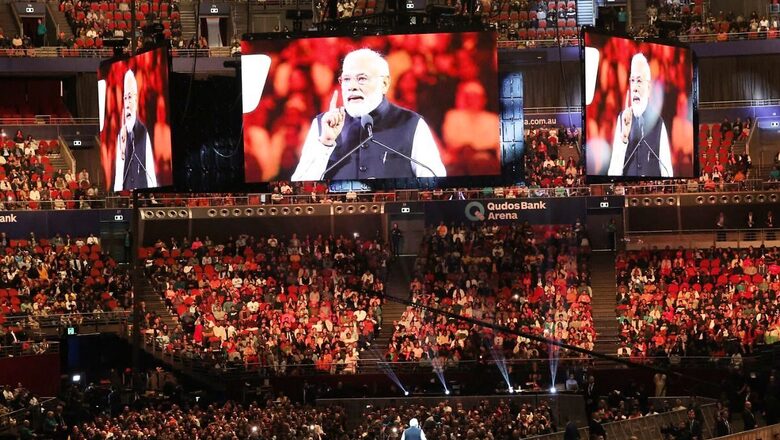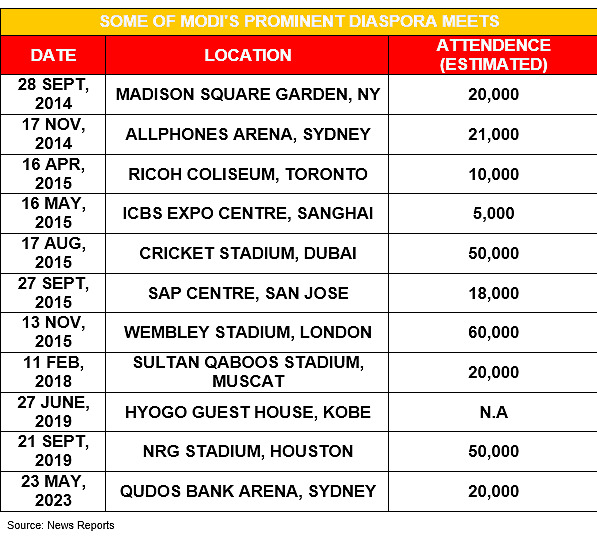
views
On June 23, 2023, Prime Minister Narendra Modi will address the Indian-American community from across the U.S. in Washington D.C. on the role of the diaspora in India’s growth story. The reportedly two-hour event at the Ronald Reagan Building and International Trade Center will be PM Modi’s fifth major talk to the diaspora in the country.
Reaching out to the diaspora has become a defining feature of the foreign policy of the Modi government.
In the past, he had addressed the Indian community at the Madison Square Garden, New York, in September 2014, followed by the SAP Center in San Jose in September 2015, the Ritz Carlton in Washington DC (June 2017), and again the ‘Howdy Modi’ event in Houston in September 2019. The last rally with then US President Donald Trump in attendance was termed the largest-ever gathering with a foreign political leader in the US.
And it’s not just PM Modi, Congress leader Rahul Gandhi, too, has been making news for his recent frequent addresses to the diaspora, the most recent ones in New York and San Francisco.
Other than the U.S., PM Modi had addressed the diaspora in many other countries, including Australia, UAE, Oman, Germany, the U.K., and even China.
The speeches of leaders, including PM Modi and Rahul Gandhi, during these outreaches have often become a subject of debate and political slugfest back in India.
But do these political events on foreign soil create any impact on domestic politics back home? Is this a new trend?

EXPERTSPEAK
“Before the Modi era, interactions of political parties with the Indian diaspora were transient, resembling foreign extension counters displaying their ideology and work to a select group of admirers,” said Praveen Rai, a political analyst at the CSDS in Delhi.
“However, since 2014, PM Modi has not limited these meetings and has expanded both the scale and scope of these interactions,” Rai explained, adding, “Such connections have played an important role in national election campaigns as they get votes for parties, in addition to acquiring foreign donations and technical expertise.”
Dr Manan Dwivedi, Assistant Professor at the Indian Institute of Public Administration (IIPA), New Delhi, added that “the wealth and influence of Indian entrepreneurship are prominent factors in today’s world” and “the amplification and significance of the Modi denomination are reflected in public opinion in India”.
The influence of the diaspora in Indian elections is on the rise.
An absolute delight connecting with the Indian diaspora at the community programme in Sydney! https://t.co/OC4P3VWRhi— Narendra Modi (@narendramodi) May 23, 2023
KARNATAKA SUCCESS
“The support of the overseas Indians for the Congress played a prominent role in the party’s recent victory in the assembly polls in Karnataka,” said Rai.
Ahead of the 2023 Karnataka assembly elections, then state Congress president D K Shivakumar had asked Non-Resident Indians (NRIs) of Kannadiga origin to give their suggestions towards shaping the party’s manifesto.
The Bharatiya Janata Party’s (BJP) outreach to the Indian diaspora is primarily led by the Overseas Friends of the Bharatiya Janata Party (OFBJP). “The BJP created a political forum called the ‘Overseas Friends of BJP’ and initiated deep engagement with the diaspora for two reasons. Firstly, it acts as a brand ambassador for the party and creates an international image of a strong and rising India under Modi. Secondly, its foreign recognition mobilises kinship and ethnic proximity networks to vote for the saffron party in the national elections,” explained Rai.
The success of the BJP with overseas Indians has not gone unnoticed by other political parties. Of late, Gandhi has been visiting Western institutions and engaging with the Indian diaspora. A few days ago, Aam Aadmi Party (AAP) leader Atishi was in Cambridge.
The Congress’s efforts in this direction are led by the Indian Overseas Congress, headed by Sam Pitroda. “The Congress is trying to catch up with the BJP in the game. Gandhi’s meetings are also being scaled up,” said Rai, adding, “The party has realised that a closed-door gathering with select individuals or VIPs has its limitations.”
Had a thought-provoking fireside chat with leading thinkers of New York at the iconic Roosevelt House, home of former US President, Franklin D Roosevelt. pic.twitter.com/odgjB2ta1P— Rahul Gandhi (@RahulGandhi) June 4, 2023
HISTORICAL, SOCIAL CONTEXT
Social scientists also point out the historical and social context of these outreach efforts.
“Immigrants worldwide have a significant social and economic impact on their respective homelands,” explained Sushant Jha, the translator of Ramchandra Guha’s ‘Gandhi’ series books and the Commissioning Editor of Penguin Hindi.
“It’s like following a foreign brand, which we as Indians are fond of,” explained Rai. “When those residing in America tell their family members about their political preferences back home, they get influenced. Their (diaspora) numbers may be small, but these are powerful voices and have contributed to the BJP’s vote tally in India.”
India boasts of a substantial global diaspora, comprising more than 32 million individuals, including over 13 million Non-Resident Indians (NRIs) and 18 million Persons of Indian Origin (PIOs), as on December 25, 2021.
“The phenomenon operates at various levels,” Jha said, citing examples of state-level politicians or Chief Ministers who attempt to hold rallies or public meetings in the national capital or metropolitan cities. They believe that their image and communication, stemming from the top, will have a greater impact on the people of their state.
The story of CM @ArvindKejriwal’s education revolution has gone global, yet again!Shared the journey of transforming Delhi’s tin-shed schools into some of India’s best educational institutes, with the Faculty of Education at @Cambridge_Uni#AtishiAtCambridge#KejriwalModelinUK pic.twitter.com/UJP1wv8usT
— Atishi (@AtishiAAP) June 18, 2023
A TWO-WAY PROCESS
The reverse of this phenomenon also holds true.
“Any adverse news originating from prominent locations also carries the same magnitude of negative impact. For instance, the sight of a Khalistani flag near the Indian High Commission in London or separatist posters in cities like New York or Berlin equally distress Indians back home,” said Jha.
On numerous occasions, the foreign rallies led by PM Modi have seen the participation of national leaders from the host countries.
In November 2015, then British PM David Cameron introduced the Indian PM to approximately 60,000 British Indians gathered at London’s Wembley Stadium for a rally honouring the latter. In September 2019, the ‘Howdy Modi’ event in Houston drew an attendance of 50,000, with Trump joining Modi on stage. More recently, in April, Australian PM Anthony Albanese lavished praise on the Indian PM during an Indian community event in Sydney.
These appearances by foreign leaders are not incidental or just to appease the guest, but a part of a well-thought-out political and diplomatic design that works for both the Indian leaders and the hosts.
“There is a sort of quid pro quo here, a two-way process…Although Trump did not win in 2020, he definitely increased his vote share compared to the 2016 polls,” Rai pointed out, referring to the then U.S. president’s presence at the ‘Howdy Modi’ event.
In the 2016 U.S. presidential elections, Republican candidate Trump secured 46.1% of the votes, which increased to 46.8% in 2020.
Although there is no survey or record in India to show how NRI support impacted voting for the Modi-led BJP, limited studies conducted in the United States suggest that the Indian PM remains popular among the diaspora. “The Indian diaspora responds very proactively to the call of PM Modi, as was evident during his visits to Madison Square Garden and ‘Shark Tank’,” said Dr Dwivedi. “The diaspora analyses the support given by leaders like Albanese to the cause of the Indian population in these nations and responds accordingly.”
Further, according to political watchers in the U.S., overseas Indians in America tend to be more supportive of PM Modi rather than the BJP, as a significant number of Indian immigrants in the country have their roots in South India, where the BJP is still striving to establish a strong presence.
This assumption is also supported by a 2020 YouGov-backed online survey of 1,200 Indian American adults, where approximately 50% of the respondents approved of PM Modi’s performance.




















Comments
0 comment